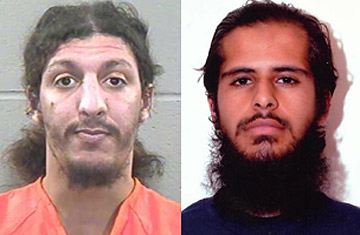
Shoebomber Richard C. Reid (left) and Aabid Khan
The Mumbai siege marked a dramatic and unexpected escalation of the terror campaign of the Pakistan-based jihadist outfit Laskhar e-Toiba (LeT) — and European counter-terrorism officials fear that escalation may eventually have dire consequences in the West. That's because LeT is believed to be expanding its networks in Europe. Although that activity has been limited, and largely confined to supporting the organization's efforts in South Asia, were the organization to raise its operational ambitions in Europe, it could present a terror threat on the continent as deadly as that of al-Qaeda.
"Today, LeT is the hardest-core, export-minded jihadist group in south Asia — and probably anywhere in the world," says Jean-Louis Bruguière, formerly France's top terrorism investigator who now represents the E.U. on a bilateral Terrorist Finance Tracking Program in Washington. "We've already seen signs of it at work among Pakistani communities in the U.K., Spain and even France. And there's evidence LeT has spread its influence with al-Qaeda-inspired extremists in Europe over the past two or three years."(See images of Mumbai picking up the pieces)
With Pakistan confirming LeT leader Zaki ur-Rehman Lakhvi was one of two men arrested Tuesday in connection with the Mumbai attacks — and the lone surviving assailant admitting his unit was trained and dispatched by the organization — security analysts have little doubt that LeT was behind the raid. But analyst opinion is divided over whether the audacity of the strike indicates a strategic expansion of LeT's jihadist ambitions, or simply an innovation in terror tactics. Though LeT's methods in Mumbai raised the bar of death and destruction, some experts don't expect the group to expand its target range too far beyond its south Asia stronghold.
"Lashkar has had only limited activity in Europe — mostly because its traditional focus has been on the so-called 'freeing' of Kashmir, meaning it has almost exclusively attacked India," notes a French anti-terror official who asked to remain anonymous, adding that even though the Mumbai targets included international tourism sites, the purpose of the strike was to deal a blow to India. "The potential is there for Lashkar to transform itself into a leading force of international jihad, but I'm skeptical that it's already underway. For the moment, the signs of it organizing or sponsoring attacks in Europe aren't anywhere as numerous as those involving radicals associated with al-Qaeda or its north African incarnations."
Still, even if they're currently eclipsed by the actions of other jihadist groups, militants associated with LeT are believed to have planned terror strikes in Europe. Last January, for example, Spanish police arrested what was described as a cell of 14 Pakistani and Indian supporters of LeT, on evidence that the group had been planning a suicide strike in Barcelona. British authorities, meanwhile, reported LeT links among some of the suspects arrested for purportedly plotting to blow up several trans-Atlantic flights using liquid explosives in August, 2006. French officials also believe that failed shoe-bomber Richard Reid had been housed and cared for by LeT sympathizers in Paris ahead of his thwarted December, 2001 attack.
Bruguière reveals that extensive insight into LeT was gained from the interrogation of Willie Brigitte, a French convert to radical Islam arrested in 2003 in Australia on a suspected mission to bomb Sydney's electricity grid. Brigitte told investigators he'd been trained in LeT terror camps after seeking out the group in Pakistan once the U.S-led invasion of Afghanistan had closed al-Qaeda training camps that had once attracted aspiring jihadists living in the West. Similarly, British radical Aabid Khan spent time in LeT training and indoctrination installations in Pakistan before his arrest in 2006, after flying into Manchester carrying jihadist propaganda, maps and surveillance information of potential targets in the U.S. Earlier this year, Khan was convicted by U.K. courts on terror-related charges.
Despite those instances of European radicals returning to the continent to plot actions at home, the cases of LeT-trained operatives setting up operations in Europe remain the exception, officials say. "Lashkar still tends to train recruits to inject them into their regional struggle," the French counter-terrorism official notes. "By contrast, al-Qaeda trained recruits to its Afghan camps for injection back into terror networks in the societies they came from."
Still, the official notes, Brigitte told interrogators that while training with LeT, he'd met with uniformed officers from Pakistan's ISI intelligence service. The ISI has long been accused of aiding and financing LeT as a proxy army to undermine India's possession of Kashmir; that link, the French official believes, has functioned as a restraint on the jihadist group."ISI sponsorship has meant Lashkar has had to accept limitations on its action, and contribute to global jihad via support and local partnerships with al-Qaeda in the region," the official says. "It would be very troubling if Lashkar managed to get off that leash."
